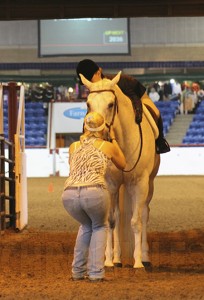Research Shows Combining Horses and Children with Autism May Improve Motor Performance and Behavior
Horse and Humans Research Foundation
Chagrin Falls, Ohio, May 6, 2014 – Research from Washington University in St Louis indicates that treating children who have autism in occupational therapy sessions utilizing the movements of the horse, commonly called hippotherapy, may significantly improve balance, social responsiveness and other “life outcomes.”
The Horses and Humans Research Foundation provided funding to Washington University in St. Louis with the purpose of determining if using horse movement (hippotherapy) could improve balance and behavior in children with Autism. The team measured outcomes from Occupational and Physical Therapy using horse movement (hippotherapy) for children with Autism Spectrum Disorder (ASD). The project was innovative because it used objective quantitative data collection in addition to qualitative standardized clinical scales.
The project followed thirteen children with Autism Spectrum Disorder as they participated in 12 weeks of 45-minute weekly hippotherapy sessions. These weekly treatments were conducted by an occupational therapist (OT) or OT Assistant who used horses, their movement and related activities as a primary part of the OT treatment.
“Hippotherapy is commonly used for children with ASD,” said Principal Investigator Tim L. Shurtleff, OTD, OTR/L. “However, up to this point no systematic evidence had been published on the impact of hippotherapy on children with ASD. No studies of hippotherapy have been reported about children with ASD but many children with ASD participate in hippotherapy. Evidence was needed to support treatment planning, and to support reimbursement for these interventions.”
Quantitatively, several variables studied indicated that participants had significant improvements in balance. Improving balance may enable these children to participate in many activities which may have previously been difficult for them. Qualitatively, interviews with parents to measure social responsiveness, sensory response, adaptive behaviors and outcomes at home, at school and on the playground were used to determine if treatments made a difference in the lives of the participants with ASD. Several “life outcomes” were found to be significant. Parents reported the child learned to listen better, became less stubborn or sullen, showed higher levels of confidence during participation in leisure activities, played and interacted more appropriately with peers and they gained better body awareness.
Based upon these results, hippotherapy treatment may provide an alternative treatment that could enable children with ASD to participate more in typical activities of childhood with their peers.
Horses and Humans Research Foundation is the only organization dedicated solely to funding research to support the equine-assisted activities and therapies field. Since its founding, HHRF has awarded $400,000 in professional research efforts led by eight research teams in the United States, Canada and Germany. This is the second grant the Washington University in St Louis team has received from HHRF.
To make a donation and/or learn more about this and other Horses and Humans Research Foundation projects please email info@horsesandhumans.org or visit http://www.horsesandhumans.org.











